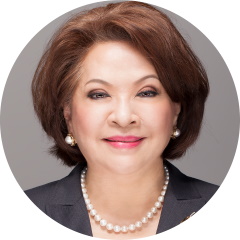11/02/2014
開放愛情
Mei Ling
Mei Ling
廖吳美玲Mei Ling,做為電視真人騷《盛女愛作戰》幕後顧問一夜爆紅,因其經驗豐富,點評中肯直接,且手握優質筍盤無數,被譽為鑽石媒人,備受好評。其創立的香港婚姻介紹所Hong Kong Matchmakers。
Mei Ling曾於紐約婚姻介紹學院就讀,成為美、德註冊婚配師,創立香港婚姻介紹所,有別於其他婚介所,Mei Ling所設門檻很高,專為香港單身高學歷人士作婚姻配對,創辦16年,成功撮合的高層男女不下數百對。
Mei Ling曾於世界頂級大企業任要職,包括貿發局法蘭克福貿易顧問等。曾獲歐盟市場開拓及業務發展比賽冠軍,成為首位女性及華人獲得此殊榮。亦曾創立自己的時裝生意,在高峰時賣盤。
著有《How to Find A Husband》。 Man Manual, Navigating Relationships鑽石媒人Mei Ling
香港是處充滿矛盾的地方,在愛情的問題上,沒有地方較此地更為明顯。在很多方面,我們似被「西化」,但只沾上表面的一層。掀開表層,即曝露底蘊,正如不論我們能說得一口多流利的外語,計數或心算時必以母語。內心深處,儘管懂現代化的科技、自由貿易、全球化的理念,在背景、文化、教養及核心價值上,中西思想依然各走極端。
人類性學及伴侶關係專家,康乃爾大學的人類發展學教授Cythia Hazan,提出的「當代關係學」(contemporary relationship science),為社會及人格心理學的研究範疇定下新義,理論以生物化學、心理學、發展及進化的角度剖析「愛」,分析別人對自己在性慾及情感上的吸引力。不出所望,美國人經常是優秀的「講者」,即他們天生擁有把事情說盡的能力。私人的痔瘡、同性戀、《陰道獨白》等等,是無所不談且作公開討論;有人感興趣,就要把感受從最深處挖出攤開示人。有人認為公開抒發受壓抑的感受是健康的現象,其他則感到厭惡,甚至是被冒犯。他們認為媒體的力量將錯誤的觀念肆意演繹成時尚。
某程度上,法國人較含蓄,但會坦然展露情緒。以三劍客中的Athos、Porthos、Aramis及d’Artagnan為例,四個雄糾糾的戰士會無畏無忌的彼此讚揚,又毫不羞澀的向對方表達「愛」意,做到「人人為我,我為人人」(un pour tous, tous pour un)。想也不用想,中國男性少有公開承認自己有此種感覺。當歐洲人及南美洲人與友人相見時互吻額頭示好,我們仍羞於以廣東話講一句「我愛你」。
歷史上,中國人的哲學思想分三大主流:儒家、道家、佛家,三大家都不談愛情。儒家思想的道德、哲學論由儒學發展而成,以孔子為先師。核心價值為「人本」,強該家庭價值的重要性。部分基本的道德觀包括仁、義及禮。對「愛情」沒有清晰的討論。
道家學說傳統地專崇老子、不朽、祖先,配以各式各樣的占卜、祭祀,以及追求不朽、長生不死之術。道家的禮節與道德觀或經變遷,但一般來說,無為、自然、簡單、自發為道家所強調;憐愛之心、中庸之道、謙遜之德為道家所珍惜,可是「愛情」的題目亦是落空。
佛家的傳統及行為基於佛家三寶:佛寶、法寶及僧寶。其他的宗教活動包括道德訓誡,支持修道,拋開世俗,存善念,禪修,求智慧啟佛眼,研頌經文......「愛情」則為罪孽的根源,擾亂個人的靈性。
曹雪芹的《紅樓夢》能成為經典名著只因筆下的賈寶玉決意摒棄傳統,追尋不同。在封建禮教的對比下,激進的寶玉擁有膽量,公開地以詩言情,追求戀愛自由,娶他所認定的伴侶。這才是我們「愛情」學問的第一門課。
往事如烟。我們不必如美國人般解剖「愛情」,又不必強迫我們的男性互相親吻示好,需要的是代入我們的時代,擺脫過去的封建枷鎖,學習去認清、滋長、開展、培養一種平常渺小的情感,它叫做「愛情」。
(按:中文內容乃翻譯及撮寫版本)
Love
Hong Kong is a place full of contradictions. Nowhere is it more apparent than in the subject of love. We may seem to be “westernized” on many fronts, but that is mostly superficial. Scratch the surface a little, and the true colours always prevail, just as however fluent we might be in any language, we always count in our mother tongue. In matters of the heart, in spite of modern technology, free trade and globalization, east and west still stand at polar opposites because our background, culture, upbringing, and core values are so different.
Cynthia Hazan, Professor of Human Development at Cornell, a specialist in human mating and pair bonding, has helped define a new field of study in social and personality psychology called “contemporary relationship science” which dissects “love” into biochemical, psychological, developmental, and evolutionary factors, analyzing the sexual and emotional appeal of another person. Unsurprising, since Americans have always been good “talkers”, viz. they have this innate ability of discussing everything to death. They think nothing of talking about their hemorrhoids in public, their homosexuality, “The Vagina Monologue”… and they articulate their deepest inner feelings to anybody who cares to listen. Some deem it healthy to air suppressed feelings in the open, others consider it distasteful, or even offensive. Still others find that the power of the media profligate wrong ideas to be fashionable.
The French may be more subtle in some ways, but upfront about their emotions nonetheless. Take the Three Musketeers Athos, Porthos, Aramis, and d’Artagnan for instance, here are four macho warriors who would celebrate their feelings with audacious openness and unabashedly proclaim their “love” for each other “ All for one, one for all”(un pour tous, tous pour un). It is unthinkable for Chinese men to admit such feelings to themselves, much less in the open. While continental Europeans and South Americans continue to kiss each other on encounter, we still get goose bumps saying “ I love you” in Cantonese.
Historically, Chinese philosophy has always been governed by three schools of thoughts: Confucianism, Taoism, and Buddhism, none of which would speak about love. Confucianism is an ethical and philosophical system developed from the teachings of Confucius which became the official state ideology of the Han. The core is humanism, practicality and the importance of family values. Some of the basic Confucian ethical concepts and practices include ren, yi, and li. “LOVE” was clearly not discussed.
Taoist schools traditionally feature reverence for Laozi, immortals or ancestors, along with a variety of divination and exorcism rituals, and practices for longevity or immortality. Taoist propriety and ethics may vary, but in general tends to emphasize wu-wei (action through non-action), "naturalness", simplicity, spontaneity, and the Three Treasures: compassion, moderation, and humility. Again, “LOVE” was conspicuously omitted.
The foundations of Buddhist tradition and practice are the Three Jewels: the Buddha, the teachings, and the community. Other practices include following ethical precepts, support of the monastic community, renouncing conventional living, the development of mindfulness, practice of meditation, cultivation of higher wisdom and discernment, study of scriptures……〝LOVE〞 was generally considered the root of all evils, interrupting one’s soul from the above.
Tsao Hsueh-Chin’s Dream of the Red Chamber became a phenomenal classic because Tsao, through his Chia Pao-yu, dares to defy tradition and be different. Contrary to feudal ethics, the rebellious Pao Yu had the audacity to profess his love openly in his poems and yearns for the freedom to love and marry whomever he chooses. That, was practically our lesson number one in the subject of “Love”.
A lot of water has since gone under the bridge. While it is unnecessary for us to dissect “LOVE” clinically like the Americans do, nor force our men to kiss other men, we should live within our times, emerge from the bondage of our feudal past, learn to recognize, cultivate, develop and nurture this healthy, normal little emotion called “LOVE”.
《經濟通》所刊的署名及/或不署名文章,相關內容屬作者個人意見,並不代表《經濟通》立場,《經濟通》所扮演的角色是提供一個自由言論平台。
【你點睇】陳美寶、羅淑佩分別被任命為運物局及文體旅局局長,你是否認同新任命有助香港鞏固物流樞紐地位及促進旅遊經濟?► 立即投票


































